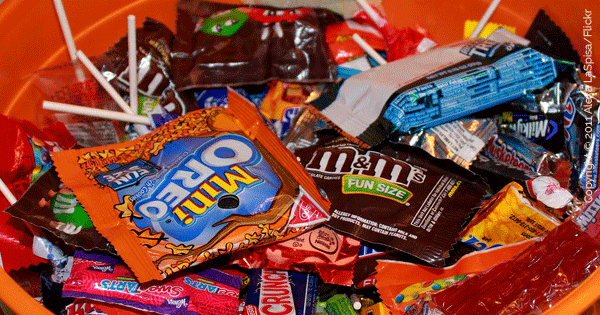Advertisement
Whether you welcome the fall season with a pumpkin spice latte or a handful of Halloween candy, chances are you are celebrating the changing season with sugary snacks.
With Halloween right around the corner, you might be tempted to eat a few pieces of that delicious Halloween candy you're handing out to neighborhood kids. A few pieces won't hurt, sure, but what happens to your brain if you accidentally overdo it?
The affect sugar has on your brain starts when you take your first bite (or sip).
"Your tongue’s sweet taste receptors detect the sugary deliciousness. They respond by sending signals to your brain’s cerebral cortex, which fires up your reward system," explains Nicole Avena, Ph.D., author of Why Diets Fail. "Sugar receptors in your gut further fuel this reward system response." Your brain then asks the question: should I do this again? Almost always, the answer is a resounding "yes!"
Sugar releases dopamine, a type of neurotransmitter that floods your noodle in response to pleasurable activities. It's the same response as alcohol, nicotine, and even illicit drugs! For that reason, it can easily lead to addiction. "The more of it you have, the more you want," Avena says. "In fact, a Connecticut College study suggests Oreos might be more addictive than cocaine."
"Since sugar is your body’s primary source of fuel—and something that’s hard to come by in nature—the human brain may have evolved to seek out sweets more than food. Basically, your brain wasn't designed to handle a world that offers you easy, cheap access to massive amounts of sugar," Avena says.
"Of course," she adds, "fruit and some other healthy foods contain sugar too—just not in the same ultra-dense concentrations found in processed treats like cookies or candy." Not to mention, fruits and other healthy food likely contain a healthy dose of fiber that slows digestion, allowing your body to handle the sugar more slowly.
30 minutes after your first bite, the sugar has made it's way into your system and you experience the "sugar rush." Your body has to work hard not to overload and poison your liver with all that sugar, so it ends up storing the excess sugar in muscles and fat tissue. "Research from the University of Minnesota has shown even short periods of hyperglycemia can mess with your attention span and memory," Avena explained.
What about the inevitable sugar crash? If you eat too much sugar too often, it can overload your system to the point that it simply can't handle the sugar anymore, leading to diabetes. Even just a huge sugar rush can have adverse effects on the brain, hurting the brain's functions. A study from Tufts University showed that everything from speaking and attention span to information processing speed suffers.
"Of course, none of this is an issue if you only have sugar once in a while. But again, eating sweets can snowball. If you feel like you’re craving sugar all the time, the only way to break your habit is to wean yourself off one small step at a time," Avena says. Try this: if, for exmaple, you tend to have two cans of soda a day, cut your soda consumption to just one can. After some time, try going without.
“Cold turkey doesn’t work,” Avena stresses. “You need to re-train your brain to crave healthier foods.”
Feel free to indulge in a little Halloween candy, but just remember that sugar consumption can snowball!
What do you think about this? What were you surprised by? Let us know in the comments!
Copyright © 2011 Alexa LaSpisa/Flickr




